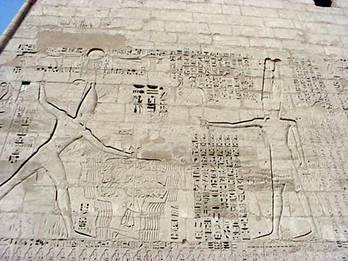2007.06.24 14:10
Anti-Starchitecture Chic
Funny how the lion's share of great architecture was created before there even was a camera with film.
My favorite line from Mann's Joseph and His Brothers comes almost at the very end--"They used their own lenses."
Maybe I'm rare, but the top of the list of my preferred architectural representation has always been the ichnographia, the plan view, and the photographic image almost always at the bottom of the list, except when it's fucked by context--site of street shooting a day or two after the theaters here were opened.

Has the preferred photographic architectural image really only blinded "us" to the actual relativity of it all.
2007.06.24 12:04
Archi-Edu
Q: How can you make or translate architecture to make it educational or contribute to the learning experience?
A:
 
...and for the blind, cover the building with braille.
| |
2007.06.24 10:47
Anti-Starchitecture Chic
Did there even have to be a backlash to Archigram's proposals? There may well have been a "system" backlash, but did Archigram even offer a viable alternative in practice? Would not their proposals have become "reality" on their own merit if they indeed were viable? To me, citing Eisenman and Rossi as somehow linked (or is it responsible) for the "failure" of Archigram seems a bit too much like shifting the blame.
If you do some research you might just be right, but don't do it with the assumption that Archigram is completely blameless itself.
2007.06.24 10:25
What Is Art?: Conversations With Joseph Beuys
Sunday, March 8, 1981--Düsseldorf
We had breakfast with Joseph Beuys, he insisted I come to his house and see his studio and the way he lives and have tea and cake, it was really nice. He gave me a work of art which was two bottles of effervescent water which ended up exploding in my suitcase and damaging everything I have, so I can't open the box now, because I don't know if it's a work of art anymore or just broken bottles. So if he comes to New York I've got to get him to come sign the box because it's just a real muck.
"...that the playful activity has its own dynamic."
2007.06.23 12:56
Anti-Starchitecture Chic
So, within the 'star system' who then are the "stars" and what form-buildings got the press? As large as the realm of architecture is, it's still a finite set, so we can actually be specific rather that general. Gehry, Koolhaas, Eisenman, Hadid--are these at least on the list of 'who is a starchitect'?
How buildings get press is what should be much more studied. For example, having "Guggenheim" attached to any building design will get lots of press because the Guggenheim already has a whole staff department devoted to generating press, besides the fact that the major mission of the institution itself is to exhibit. Ironically, the "Virtual Guggenheim" by Asymptote was pretty much literally just press.
If starchitects are really just pseudo celebrities, is that then already a sign of just how relative starchitect status is?
Is "a style" really such a bad thing? I actually see a lot of diversity from architect to architect, and even with a specific architect's oeuvre there is often diversity at least via nuance, if not actually just plain diversity. I thus question the full validity of "same bag of (increasingly superficial) formal tricks."
One could also argue that there is now-a-days a whole lot more critical architectural criticism going on, but it all right away falls into various camps--New Urbanism, Bilbao effect, anti-starchitect, etc.(?)
Most people I know know absolute nothing about architectural style. I'd go so far as to say that even most architects don't know all that is really going on design-wise now-a-days.
"Lesser known architects follow the public's new tastes."--that sounds very subjective to me.
"Architecture" loses yet another battle." --Is an imaginary battle really a battle? Can an imaginary battle really be lost?
I'll leave it at that, but I think the second set of points of regarding Archigram and backlash casts much too large a net, with big holes. Somewhat insular itself even.
parting shot:
Architects can well design buildings, put I don't think they'll ever be able to design clients.
| |
2007.06.23 11:33
Anti-Starchitecture Chic
There is a lot of structural and spatial and design innovation going on that makes 'signature buildings' more than only a commercial backdrop. Many 'signature buildings' actually make significant contributions to architectural history. Perhaps a more real issue it that the distinction betweeen hype and history is completely ignored to the point where the hype is what becomes a much distorted history.
2007.06.23 11:19
Anti-Starchitecture Chic
I still wish there were better objective explanations of what today's star system is. Is it the design of the buildings that get media attention? Is it how the media portrays "architecture" to the rest of the world? Is it something else? What is it exactly?
Your question "Is today's starchitect system a backlash to the idea, that Archigram first proposed, that architecture does not matter any longer, only media." suggests a strange (mythical?) one-or-the-other, or one having an adverse effect on the other. To me, it is again the neglect of recognizing the real relativity of the situation. Archigram's "proposal" is certainly not an absolute, whereas, it looks like the "star system" is percieved as being a little too close to an absolute. Yet, that too is very relative given that virtually the only people that concern themselves with architecture's star system come from within the architecture system itself.
So, again, is the star system of architecture really about how the media cover architecture? And then, is the 'anit-staritect chic' 'movement' a longing to have the media cover architecture differently?
Related to Oppenheim, randomness effecting architecture is definitely nothing new, and there is real potential for folly in architect's now somehow thinking that they can even 'design' for the randomness.
Within drama there is definitely such a thing as over-acting. I think there is also such a thing as over-architecting.
2007.06.22 18:08
Anti-Starchitecture Chic
You're right, they were different times, but the point is that we should all have a more precise picture of those times, and this is where web publishing offers an opportunity to see heretofore undisclosed historical data more easily published. Maybe what Quilian is longing for is just a more honest representation of what architecture is all about. For me, the longing is for full disclosure and diversity. The "star system" doesn't really engender that, (and I would say even academia harbors selective censorship).
2007.06.22 17:32
Anti-Starchitecture Chic
From "Form Follows Fascism", published 31 January 2005 in the NY Times:
Philip Johnson did not just flirt with fascism. He spent several years in his late 20's and early 30's - years when an artist's imagination usually begins to jell - consumed by fascist ideology. He tried to start a fascist party in the United States. He worked for Huey Long and Father Coughlin, writing essays on their behalf. He tried to buy the magazine American Mercury, then complained in a letter, "The Jews bought the magazine and are ruining it, naturally." He traveled several times to Germany. He thrilled to the Nuremberg rally of 1938 and, after the invasion of Poland, he visited the front at the invitation of the Nazis.
He approved of what he saw. "The German green uniforms made the place look gay and happy," he wrote in a letter. "There were not many Jews to be seen. We saw Warsaw burn and Modlin being bombed. It was a stirring spectacle." As late as 1940, Mr. Johnson was defending Hitler to the American public. It seems that only an inquiry by the Federal Bureau of Investigation - and, presumably, the prospect of being labeled a traitor if America entered the war - led him to withdraw completely from politics.
Today, any debate over an important figure with a fascist or Communist background easily becomes an occasion for blame games between right and left. Mr. Johnson is no exception. Morally serious people can have different views of his personal culpability.
=====
So, did Johnson use his money to "rehibilitate" himself? Was he a shameless person? Was he really evil? What lead him to architecture?
|